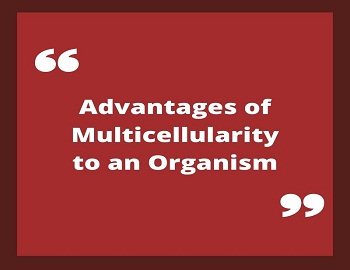Advantages of Multicellularity to an Organism:
The following are the advantages of multicellularity to an Organism-
- The multicellularity to an organism results in producing division of labour amongst its cells. These cells become specialized to perform different functions in a coordinated manner.
- Each cell of a multicellular organism performs a specific function and avoids the duplication of work. So, the activity of a multicellular organism is much more efficient than a unicellular organism.
- All the cells of a multicellular organism are not exposed to the environment except only a few of them. Tissue fluid is found around the cells of a multicellular organism, which offers a constant environment, proper osmoconcentration and other nutrients etc. This increases the overall efficiency of multicellular organisms.
- The death of a few cells does not kill the multicellular organism. The outermost cells of the skin, epithelial cells of the intestine and RBCs are regularly shed off and they are replaced by new cells.
- The surface cells of multicellular organisms are mainly dead and provide support and protection to the body. For example, nail horns, hooves, feathers and claws are the dead structures and are protective in nature.
- Multicellular organisms bear special reproductive cells and the process of reproduction does not cause the death of an individual.
- The cells of a multicellular organism are small in size which increases the efficiency of an organism in terms of nutrient absorption and energy-saving etc. as comp[ared to one large cell of a unicellular organism.









Comments (No)